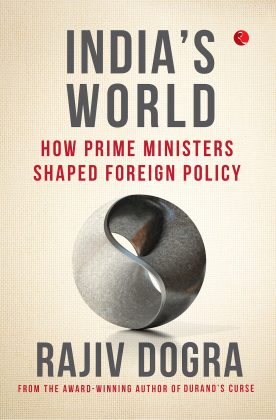
SOURCE: THE PRINT
There is one issue, however, that continues to baffle people. Pakistani tribals, supported in large numbers by its army, had invaded J&K in October 1947. In the battles that followed, the Indian army repulsed the attack, forcing the invaders to vacate some of the area they had occupied. Yet, a large portion of J&K continued to be under their occupation. The US and the Soviet Union were sympathetic to the Indian view that Pakistan was the aggressor.
But UK, the erstwhile colonial power, chose to side with Pakistan. Ironically, it was under the British pressure, articulated by the Governor General Mountbatten, that Nehru decided to take the matter to the UN in the belief that this newly created world body would weigh in on India’s side and ensure that Pakistan vacated its aggression.
Ever since, the debate has continued over the wisdom of this move. Why, critics ask, should Nehru have approached the UN when the Indian army was winning the battles? Had it been given free hand, they suggest, the army would have pushed the Pakistani invaders out of the entire territory of J&K. There is a counterview, however, that suggests that the two battling armies had reached a stalemate on ground, and that reference to the world body was the prudent option.
But critics remain sceptical, and the argument persists; why did Nehru take the Kashmir issue to the UNSC? Some Nehru apologists have tried to explain it away by suggesting that had India not made the move, Pakistan would have taken the issue to the UN. Nothing could be more far-fetched than this. There was no way Pakistan could have done this; after all, Pakistan was the aggressor in Kashmir. And the entire point in this reference to the UN was that the aggression should be vacated.
It was not the apprehension that Pakistan may pre-empt India and approach the UN that forced Nehru’s hand. Instead, British machinations in favour of Pakistan did the trick. In pursuance of that plan, Mountbatten convinced Nehru that it was morally the right course to make the reference to the world body. It was Nehru’s fault that he succumbed.
Having made the reference, he was quick to realize his mistake. Nehru was also conscious of the anger of the Indian people that this reference was made unnecessarily. In a statement he made at a press conference in New Delhi, he explained the parameters within which India had approached the UNSC:
On 30 December 1947, a formal reference was made to the Security Council through the Representative of Government of India with the United Nations… The Government of India requested the Security Council, therefore, to ask the Government of Pakistan; to prevent Pakistan Government personnel, military and civil, participating in or assisting the invasion of J&K State;
to call upon other Pakistan nationals to desist from taking any part in the fighting in the J&K State;
to deny to the invaders: (a) access to and use of its territory for operations against Kashmir; (b) military and other supplies; (c) all other kinds of aid that might tend to prolong the present struggle.
Nehru then explained that the reference to UNSC was limited to the issues he had mentioned and that there was urgency to the matter: ‘…the first step that must be taken is to put a stop to the fighting and this can only be done if the invaders withdraw.’
Sadly, the passage of history has obscured this important fact. Pakistan has taken full advantage of this amnesia to claim that the very fact that Nehru had made a reference to the UN indicates that Kashmir is a disputed territory. It was in consciousness of this that Nehru then went on to stress at that press conference, ‘It must be remembered that all the fighting has taken place on Indian Union territory and it is the inherent right of the Government of India to drive back any invaders on its territory. Till the Kashmir State is free of invaders, no other matter can be considered.’ But critics are not convinced by this explanation. They argue, and largely correctly, that Nehru fell for British scheming in favour of Pakistan, and Mountbatten’s persuasion.
Having made the reference, Nehru was soon showing signs of disillusionment with the UN and the trust he had reposed in it. In a statement in the Constituent Assembly on 5 March 1948 his cri de coeur came through clearly:
Our making a reference on this issue to the UN Security Council was an act of faith, because we believe in the progressive realization of a world order and a world government. In spite of many shocks, we have adhered to the ideals represented by the UN and its charter. But those very ideals teach us also certain duties and responsibilities to our own people and to those who put their trust in us. To betray these people would be to betray the basic ideals for which the UN stands or should stand.
Unfortunately for him and for the succeeding generations of Indians, both his idealism and the trust he placed in that world body were betrayed. Can the inference be made from Nehru’s statement that he had misjudged the world body? Or worse still, was it an error of judgment on his part to have rushed to the UN? These questions have been asked, but more in remorse or anger. Sometimes, the blame is shifted conveniently to Mountbatten. It is true that he was the evil spirit goading Nehru to make the reference to the UN, but Nehru was not a novice. He had spent a lifetime dealing with the British and observing their devious ways. Surely, as a statesman, he should have known that the world body could be a snake pit and that once you have placed yourself at its mercy, there would be diverse pulls and pressures. Yet, he experimented and called it idealism.
In a speech in the Parliament on 28 March 1951, Nehru reverted to the theme that had been troubling him and the entire nation:
The accession of Kashmir to India is entirely in conformity with the Indian Independence Act…it is also fully in accord with all that has happened in the case of other princely States which acceded to India…We did not ask the UN to adjudge the validity of Kashmir’s accession or to determine where the sovereignty lay. We did not seek arbitration but we went to them to complain about aggression by Pakistan which we thought might jeopardize world peace. The UN took advantage of our initiative in our referring the matter to them and thus enlarged the scope of their enquiry…Until now neither the UN Commission nor the Security Council has suggested that the accession was open to question.
There can be no contest with the explanatory first part of Nehru’s statement, but even this did not clarify why he chose to approach the world body. Nehru said, ‘We went to them to complain about aggression by Pakistan which we thought might jeopardize world peace.’ But he forgot to elaborate on how a localized aggression, in what was then a remote part of the world, could jeopardize world peace. Besides, if world peace was indeed at risk, the UN itself could have taken the initiative to prevent such a major war.
It is a cardinal principle of diplomacy that once you bring your dispute out in the open, the busybodies of the world will take over. Anyone and everyone feels free to interject. It happened in this case too. The US, at first because of nagging by the UK and later due to the military pacts it had signed with Pakistan, began to take increasing interest in the Indo-Pak affairs. It irritated Nehru so much that he had to bluntly tell the US ambassador that he was ‘tired of receiving moral advice from the United States.’ Nehru went on to warn that he would not back down, ‘even if Kashmir, India, and the whole world went to pieces.’






